Deck 12: Moisture, Clouds, and Precipitation
Question
Question
Question
Question
Question
Question
Question
Question
Question
Question
Question
Question
Question
Question
Question
Question
Question
Question
Question
Question
Question
Question
Question
Question
Question
Question
Question
Question
Question
Question
Question
Question
Question
Question
Question
Question
Question
Question
Question
Question
Question
Question
Question
Question
Question
Question
Question
Question
Question
Question
Question
Question
Question
Question
Question
Question
Question
Question
Question
Question
Question
Question
Question
Question
Question
Match between columns

Unlock Deck
Sign up to unlock the cards in this deck!
Unlock Deck
Unlock Deck
1/65
Play
Full screen (f)
Deck 12: Moisture, Clouds, and Precipitation
1
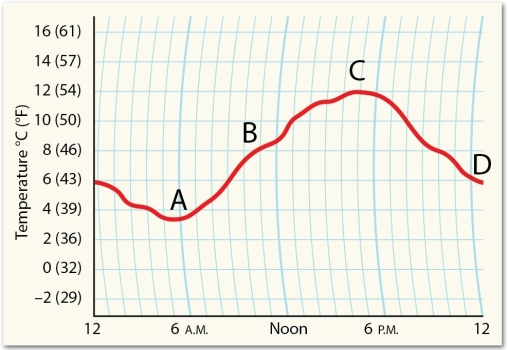
Examine the graph. Based on the relationship between temperature and relative humidity, at what time of day would an Earth scientist expect the highest relative humidity?
A)6 am
B)11am
C)5 pm
D)12 am (midnight)
A
2
"Frost" build up inside a household freezer is an example of which process?
A)evaporation
B)condensation
C)sublimation
D)deposition
A)evaporation
B)condensation
C)sublimation
D)deposition
D
3
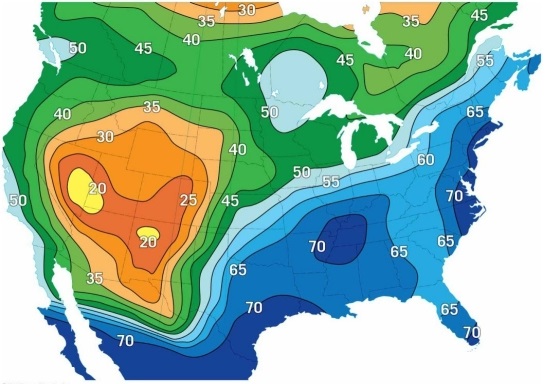
Examine the map. It shows dew-point temperatures on a typical September day. Where in the 48 contiguous United States would a psychrometer have the largest discrepancy between the dry bulb thermometer and the wet bulb thermometer?
A)southern Florida
B)western Oregon
C)northern Maine
D)southeastern Utah
D
4
A fire extinguisher containing compressed CO₂ is used to put out a fire. In spite of being close to the flames, the firefighter notices a white layer of "frost" forming on the exterior of the fire extinguisher can. What's going on?
A)The gas in the extinguisher is expanding when released, cooling adiabatically.
B)The gas in the extinguisher is cooling under higher pressure.
C)The exterior temperature must be dropping.
D)The fire is pulling heat from the surrounding air.
A)The gas in the extinguisher is expanding when released, cooling adiabatically.
B)The gas in the extinguisher is cooling under higher pressure.
C)The exterior temperature must be dropping.
D)The fire is pulling heat from the surrounding air.

Unlock Deck
Unlock for access to all 65 flashcards in this deck.
Unlock Deck
k this deck
5
Which of the following is NOT a physical mechanism that causes air to rise?
A)orographic lifting
B)frontal wedging
C)adiabatic cooling
D)convergence
A)orographic lifting
B)frontal wedging
C)adiabatic cooling
D)convergence

Unlock Deck
Unlock for access to all 65 flashcards in this deck.
Unlock Deck
k this deck
6
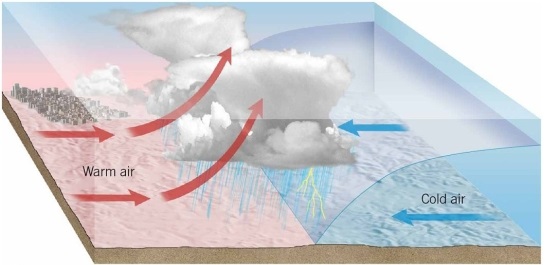
Examine the figure. Which process is illustrated?
A)orographic lifting
B)frontal wedging
C)adiabatic cooling
D)convergence

Unlock Deck
Unlock for access to all 65 flashcards in this deck.
Unlock Deck
k this deck
7
Rising air is ________ air.
A)stable
B)unstable
C)warming
D)cloudy
A)stable
B)unstable
C)warming
D)cloudy

Unlock Deck
Unlock for access to all 65 flashcards in this deck.
Unlock Deck
k this deck
8
A temperature inversion occurs when ________.
A)higher, cooler air acts like a lid, keeping warmer, lower air in place
B)higher, warmer air acts like a lid, keeping cooler, lower air in place
C)a warm front collides with a cold front
D)localized convective lifting occurs
A)higher, cooler air acts like a lid, keeping warmer, lower air in place
B)higher, warmer air acts like a lid, keeping cooler, lower air in place
C)a warm front collides with a cold front
D)localized convective lifting occurs

Unlock Deck
Unlock for access to all 65 flashcards in this deck.
Unlock Deck
k this deck
9
How does the wet adiabatic cooling rate compare to the dry adiabatic cooling rate?
A)It's higher (more degrees of temperature change per unit of change in altitude).
B)It's the same.
C)It's lower (fewer degrees of temperature change per unit of change in altitude).
D)It happens when air is compressed into a smaller volume.
A)It's higher (more degrees of temperature change per unit of change in altitude).
B)It's the same.
C)It's lower (fewer degrees of temperature change per unit of change in altitude).
D)It happens when air is compressed into a smaller volume.

Unlock Deck
Unlock for access to all 65 flashcards in this deck.
Unlock Deck
k this deck
10
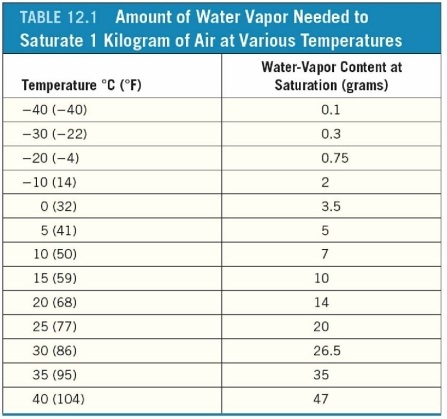
A 1-kilogram parcel of air is at 35°C and contains 7 grams of water vapor. What is the relative humidity?
A)20%
B)40%
C)50%
D)70%

Unlock Deck
Unlock for access to all 65 flashcards in this deck.
Unlock Deck
k this deck
11

Examine the figure. Which process is illustrated?
A)orographic lifting
B)frontal wedging
C)adiabatic cooling
D)convergence

Unlock Deck
Unlock for access to all 65 flashcards in this deck.
Unlock Deck
k this deck
12
The most important process of cloud formation in the atmosphere is ________.
A)cooling by compression of air
B)radiation cooling
C)cooling by expansion of air
D)cooling by release of latent heat of vaporization
A)cooling by compression of air
B)radiation cooling
C)cooling by expansion of air
D)cooling by release of latent heat of vaporization

Unlock Deck
Unlock for access to all 65 flashcards in this deck.
Unlock Deck
k this deck
13
The change of state from a gas to a liquid is called ________.
A)evaporation
B)sublimation
C)condensation
D)melting
A)evaporation
B)sublimation
C)condensation
D)melting

Unlock Deck
Unlock for access to all 65 flashcards in this deck.
Unlock Deck
k this deck
14
Adiabatic temperature changes occur ________.
A)when heat is added
B)when heat is subtracted
C)when heat is neither added nor subtracted
D)when water vapor is added
A)when heat is added
B)when heat is subtracted
C)when heat is neither added nor subtracted
D)when water vapor is added

Unlock Deck
Unlock for access to all 65 flashcards in this deck.
Unlock Deck
k this deck
15
The term ________ is used to describe the conversion of a solid directly to a gas, without passing through the liquid state.
A)evaporation
B)sublimation
C)condensation
D)melting
A)evaporation
B)sublimation
C)condensation
D)melting

Unlock Deck
Unlock for access to all 65 flashcards in this deck.
Unlock Deck
k this deck
16
Which of the following would NOT be associated with stable atmospheric conditions?
A)widespread fog
B)dreary overcast with light drizzle
C)temperature inversion
D)afternoon thunder storms
A)widespread fog
B)dreary overcast with light drizzle
C)temperature inversion
D)afternoon thunder storms

Unlock Deck
Unlock for access to all 65 flashcards in this deck.
Unlock Deck
k this deck
17
How can condensation be triggered to form clouds or fog?
A)Add sufficient water vapor to the air so that it reaches saturation.
B)Cool the air to its dew point.
C)Either of the above will work.
D)Neither of the above will work.
A)Add sufficient water vapor to the air so that it reaches saturation.
B)Cool the air to its dew point.
C)Either of the above will work.
D)Neither of the above will work.

Unlock Deck
Unlock for access to all 65 flashcards in this deck.
Unlock Deck
k this deck
18
________ is an indication of how near the air is to saturation rather than the actual quantity of water vapor in the air.
A)Mixing ratio
B)Relative humidity
C)Dew-point temperature
D)Adiabatic cooling
A)Mixing ratio
B)Relative humidity
C)Dew-point temperature
D)Adiabatic cooling

Unlock Deck
Unlock for access to all 65 flashcards in this deck.
Unlock Deck
k this deck
19
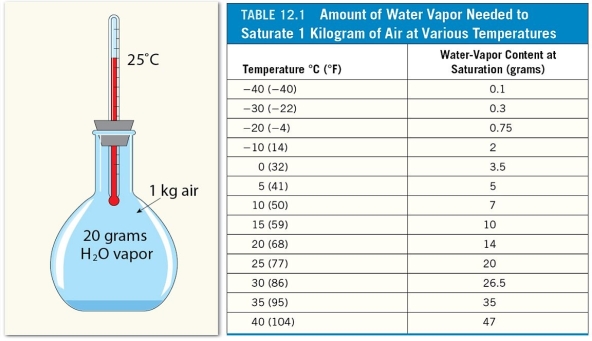
Examine the figure. This flask contains 1 kilogram of dry air mixed with 20 grams of water vapor. It is at 25°C temperature. What would happen if its temperature was increased to 35°C?
A)The relative humidity would decrease, triggering evaporation from the pool of liquid water at the bottom of the flask.
B)The relative humidity would decrease, triggering condensation, and raising the level of the pool of liquid water at the bottom of the flask.
C)The relative humidity would increase, triggering condensation, and raising the level of the pool of liquid water at the bottom of the flask.
D)The relative humidity would increase, triggering evaporation from the pool of liquid water at the bottom of the flask.

Unlock Deck
Unlock for access to all 65 flashcards in this deck.
Unlock Deck
k this deck
20
After the proper wet bulb measuring procedure, the two thermometers on a sling psychrometer yield the same temperature. This indicates that ________.
A)the relative humidity is low
B)the relative humidity is moderate
C)the air is warming up
D)the air is saturated with water vapor
A)the relative humidity is low
B)the relative humidity is moderate
C)the air is warming up
D)the air is saturated with water vapor

Unlock Deck
Unlock for access to all 65 flashcards in this deck.
Unlock Deck
k this deck
21
Hail is associated with cumulus clouds.

Unlock Deck
Unlock for access to all 65 flashcards in this deck.
Unlock Deck
k this deck
22
Why are hygroscopic nuclei important?
A)They encourage cooling of the atmosphere.
B)They facilitate warming of the atmosphere.
C)They aid in condensation, and therefore in cloud formation.
D)They aid in evaporation, and therefore in cloud dissipation.
A)They encourage cooling of the atmosphere.
B)They facilitate warming of the atmosphere.
C)They aid in condensation, and therefore in cloud formation.
D)They aid in evaporation, and therefore in cloud dissipation.

Unlock Deck
Unlock for access to all 65 flashcards in this deck.
Unlock Deck
k this deck
23
What unusual situation can occur in the absence of condensation nuclei?
A)adiabatic warming
B)a relative humidity of more than 100%
C)cumulonimbus clouds
D)cirrostratus clouds
A)adiabatic warming
B)a relative humidity of more than 100%
C)cumulonimbus clouds
D)cirrostratus clouds

Unlock Deck
Unlock for access to all 65 flashcards in this deck.
Unlock Deck
k this deck
24
The opposite of melting is condensation.

Unlock Deck
Unlock for access to all 65 flashcards in this deck.
Unlock Deck
k this deck
25
When air sinks, it compresses and warms.

Unlock Deck
Unlock for access to all 65 flashcards in this deck.
Unlock Deck
k this deck
26
Glaze is a consequence of advective fog.

Unlock Deck
Unlock for access to all 65 flashcards in this deck.
Unlock Deck
k this deck
27
What two kinds of fog are the result of adding moisture to a layer of air?
A)advection and radiation
B)radiation and upslope
C)upslope and steam
D)steam and frontal
A)advection and radiation
B)radiation and upslope
C)upslope and steam
D)steam and frontal

Unlock Deck
Unlock for access to all 65 flashcards in this deck.
Unlock Deck
k this deck
28
Which of the following is a cloud of vertical development?
A)cirrus
B)stratocumulus
C)nimbostratus
D)cumulonimbus
A)cirrus
B)stratocumulus
C)nimbostratus
D)cumulonimbus

Unlock Deck
Unlock for access to all 65 flashcards in this deck.
Unlock Deck
k this deck
29
On average, snow takes up about ten times as much volume than the same water falling as rain.

Unlock Deck
Unlock for access to all 65 flashcards in this deck.
Unlock Deck
k this deck
30
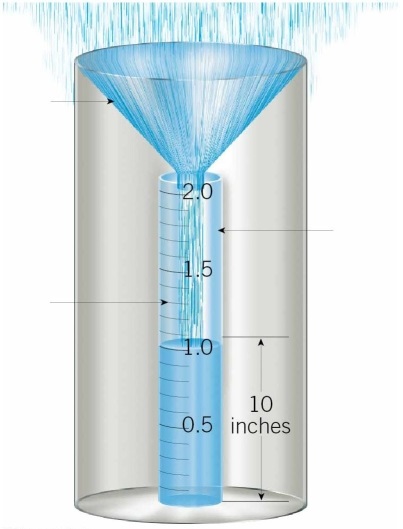
Examine the figure. Now consider whether the following statement is true or false: "This is an example of a psychrometer."

Unlock Deck
Unlock for access to all 65 flashcards in this deck.
Unlock Deck
k this deck
31
The opposite of sublimation is deposition.

Unlock Deck
Unlock for access to all 65 flashcards in this deck.
Unlock Deck
k this deck
32
Relative humidity is usually expressed as a percent.

Unlock Deck
Unlock for access to all 65 flashcards in this deck.
Unlock Deck
k this deck
33
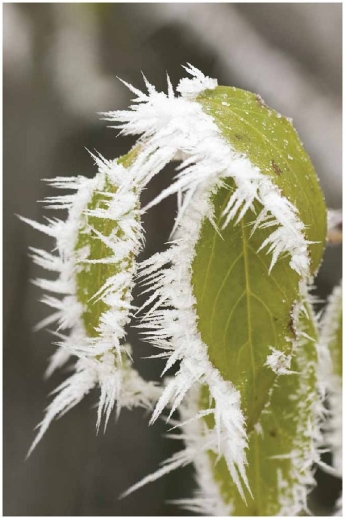
Examine the photo. Now consider whether the following statement is true or false: "This is an example of glaze."

Unlock Deck
Unlock for access to all 65 flashcards in this deck.
Unlock Deck
k this deck
34
A raindrop large enough to reach the ground without completely evaporating contains roughly 1 million times more water than a single cloud droplet.

Unlock Deck
Unlock for access to all 65 flashcards in this deck.
Unlock Deck
k this deck
35
Cirrostratus clouds are associated with stormy weather.

Unlock Deck
Unlock for access to all 65 flashcards in this deck.
Unlock Deck
k this deck
36
Radar is capable of measuring how much precipitation is falling in a given location from as much as several hundred kilometers' distance away.

Unlock Deck
Unlock for access to all 65 flashcards in this deck.
Unlock Deck
k this deck
37
The Bergeron process operates only in warm clouds.

Unlock Deck
Unlock for access to all 65 flashcards in this deck.
Unlock Deck
k this deck
38
Clouds consist of ________.
A)water droplets
B)ice particles
C)either water droplets or ice particles
D)white-colored gases
A)water droplets
B)ice particles
C)either water droplets or ice particles
D)white-colored gases

Unlock Deck
Unlock for access to all 65 flashcards in this deck.
Unlock Deck
k this deck
39
When warm moist air moves over a cold surface, ________ fog may result.
A)advection
B)radiation
C)upslope
D)steam
A)advection
B)radiation
C)upslope
D)steam

Unlock Deck
Unlock for access to all 65 flashcards in this deck.
Unlock Deck
k this deck
40
The collision-coalescence process generates big raindrops that sweep up smaller cloud droplets, thus growing bigger. Potentially, they grow so large that frictional drag from the surrounding air causes the raindrop to break apart into a larger number of smaller droplets.

Unlock Deck
Unlock for access to all 65 flashcards in this deck.
Unlock Deck
k this deck
41
________ is a type of fog that forms in valleys at night.

Unlock Deck
Unlock for access to all 65 flashcards in this deck.
Unlock Deck
k this deck
42
Mixing ratio, relative humidity, and dew-point temperature are all ways of measuring the amount of ________ in the air.

Unlock Deck
Unlock for access to all 65 flashcards in this deck.
Unlock Deck
k this deck
43
Relative to lower temperatures, high temperatures require ________ (more / the same amount / less)moisture to fully saturate the air.

Unlock Deck
Unlock for access to all 65 flashcards in this deck.
Unlock Deck
k this deck
44
________ occurs when warm air is forced up and over a mass of cooler air.

Unlock Deck
Unlock for access to all 65 flashcards in this deck.
Unlock Deck
k this deck
45
Compare and contrast absolute stability with absolute instability and conditional instability.

Unlock Deck
Unlock for access to all 65 flashcards in this deck.
Unlock Deck
k this deck
46
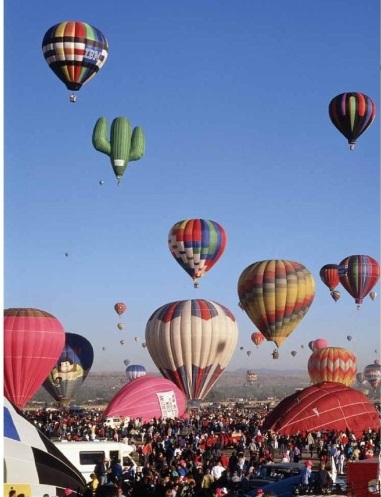
Examine the photo. These balloons are rising because the ________ air inside the balloon is less dense than the surrounding air.

Unlock Deck
Unlock for access to all 65 flashcards in this deck.
Unlock Deck
k this deck
47
________ is a kind of precipitation consisting of drops of water that fall from a cloud and have a diameter of at least 0.5 millimeter (0.02 inch).

Unlock Deck
Unlock for access to all 65 flashcards in this deck.
Unlock Deck
k this deck
48
Match the items in the first column with the correct descriptions in the second column.
A)The process of converting a liquid into a gas.
B)The process by which water vapor changes directly to a solid.
C)The general term for the amount of water vapor in air.
D)The results of a situation where the environmental lapse rate is greater than the dry adiabatic rate. This occurs when air near the ground is significantly warmer (less dense)than the air aloft.
E)This process results in the absorption of about 80 calories of latent heat per gram of water.
F)The process by which water vapor changes to a liquid.
G)The temperature at which saturation occurs.
H)The part of the total atmospheric pressure that can be attributed to the water-vapor content.
1)deposition
2)condensation
3)melting
4)evaporation
5)humidity
6)vapor pressure
7)dew point
8)absolute instability
A)The process of converting a liquid into a gas.
B)The process by which water vapor changes directly to a solid.
C)The general term for the amount of water vapor in air.
D)The results of a situation where the environmental lapse rate is greater than the dry adiabatic rate. This occurs when air near the ground is significantly warmer (less dense)than the air aloft.
E)This process results in the absorption of about 80 calories of latent heat per gram of water.
F)The process by which water vapor changes to a liquid.
G)The temperature at which saturation occurs.
H)The part of the total atmospheric pressure that can be attributed to the water-vapor content.
1)deposition
2)condensation
3)melting
4)evaporation
5)humidity
6)vapor pressure
7)dew point
8)absolute instability

Unlock Deck
Unlock for access to all 65 flashcards in this deck.
Unlock Deck
k this deck
49
________ occurs when moist air has an environmental lapse rate between the dry and wet adiabatic rates. Simply, the air is stable for an unsaturated parcel or air, but becomes unstable if the parcel of air be forced high enough for it be become saturated.

Unlock Deck
Unlock for access to all 65 flashcards in this deck.
Unlock Deck
k this deck
50
________ temperature changes are those which do not involve the addition or subtraction of heat.

Unlock Deck
Unlock for access to all 65 flashcards in this deck.
Unlock Deck
k this deck
51
Air that resists vertical motion is described as being stable.

Unlock Deck
Unlock for access to all 65 flashcards in this deck.
Unlock Deck
k this deck
52
Updrafts in cumulonimbus clouds may loft small particles of ice through the cloud, coating them and producing ________.

Unlock Deck
Unlock for access to all 65 flashcards in this deck.
Unlock Deck
k this deck
53
The ________ is the temperature to which a parcel of air would need to be cooled in order to reach saturation.

Unlock Deck
Unlock for access to all 65 flashcards in this deck.
Unlock Deck
k this deck
54
Identify and label each of the cloud types (indicated by letters)in the accompanying figure.
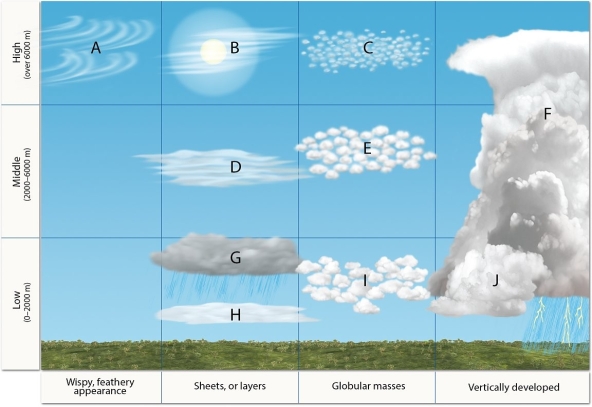


Unlock Deck
Unlock for access to all 65 flashcards in this deck.
Unlock Deck
k this deck
55
Explain how perspiring cools the skin.

Unlock Deck
Unlock for access to all 65 flashcards in this deck.
Unlock Deck
k this deck
56
________ clouds that form sheets or layers that cover much of the sky.

Unlock Deck
Unlock for access to all 65 flashcards in this deck.
Unlock Deck
k this deck
57
A wintertime form of precipitation that consists of small transparent or translucent ice particles is called ________.

Unlock Deck
Unlock for access to all 65 flashcards in this deck.
Unlock Deck
k this deck
58
Any open container having a consistent cross-sectional area throughout can be used as a(n)________.

Unlock Deck
Unlock for access to all 65 flashcards in this deck.
Unlock Deck
k this deck
59
________ is a cloud with its base at or very near the ground.

Unlock Deck
Unlock for access to all 65 flashcards in this deck.
Unlock Deck
k this deck
60
Atmospheric ________ is the ultimate cause of weather.

Unlock Deck
Unlock for access to all 65 flashcards in this deck.
Unlock Deck
k this deck
61
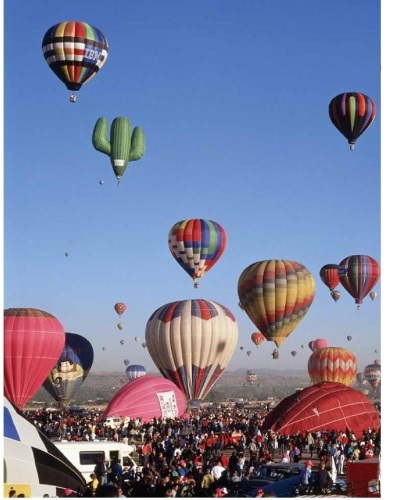
Examine the photo. Do these hot-air balloons illustrate absolute stability, absolute instability, or conditional instability? Explain.

Unlock Deck
Unlock for access to all 65 flashcards in this deck.
Unlock Deck
k this deck
62
Why is the vertical movement of air critical to the formation of clouds and precipitation? What role do adiabatic temperature changes play in these processes?

Unlock Deck
Unlock for access to all 65 flashcards in this deck.
Unlock Deck
k this deck
63
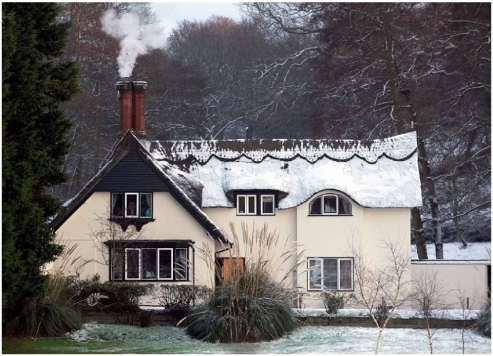
Examine the photo. Explain how the relative humidity inside the house compares to the relative humidity outside the house on this particular day.

Unlock Deck
Unlock for access to all 65 flashcards in this deck.
Unlock Deck
k this deck
64
On a warm summer day, you go outside and feel fat, cold raindrops splashing on your hands. On a winter day, you go outside and notice fat, fluffy snowflakes piling up on top of your mittens. Compare and contrast the mechanisms by which these two kinds of precipitation were produced.

Unlock Deck
Unlock for access to all 65 flashcards in this deck.
Unlock Deck
k this deck
66
Match between columns

Unlock Deck
Unlock for access to all 65 flashcards in this deck.
Unlock Deck
k this deck


